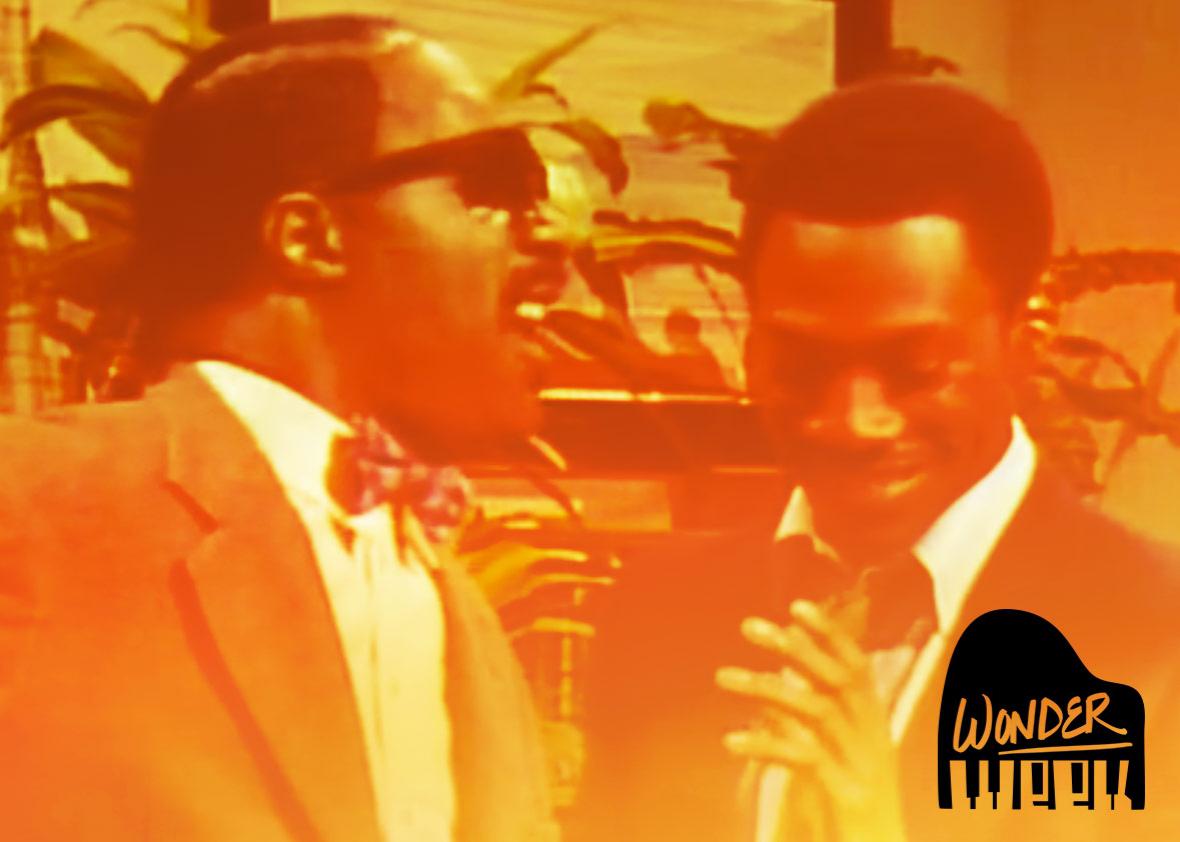Just a few weeks ago—back in simpler times—Stevie Wonder was one of Hillary Clinton’s most outspoken celebrity supporters, stumping and singing and of course cautioning voters about the dangers of electing Donald Trump. But he also wielded something he rarely gets enough credit for: his charming, slightly cornball sense of humor. “If you were in a situation where you needed to get to the hospital immediately, and you needed someone to drive you there,” he asked Stephen Colbert on a recent episode of The Late Show, a sly grin on his face, “I know you have great love for me, but would you trust me driving there?”
Colbert played along with Wonder as he drove home his fairly obvious aha! point, a comparison of his inexperience at driving (yes, he really is blind, no matter what some might say) to Trump’s total inexperience at governing: “Even with the amount I love you, I would prefer that you not drive me to the hospital, Stevie Wonder,” the late-night host responded. A moment later, Wonder mentioned he had already voted, before spotting an opportunity for a callback: “I did not drive myself there.”
It was a cute bit with a pointed message—not quite LOL-inducing but just funny enough to make you crack a smile and feel grateful for Wonder’s continued presence in our lives. Because for all his musical genius, Wonder’s well-honed talents as a showman extend beyond music, to comedy.
Much of that comedy comes from a lightly self-deprecating place, with Wonder poking fun at his blindness, as he did in that Colbert interview. On a memorable 1983 episode of Saturday Night Live, during which he pulled double duty as host and musical guest, he was featured in a fake commercial for a new camera, which is said to be “so advanced, so simple, even Stevie Wonder can use it.” The joke is once again obvious—this is SNL, after all—but it’s Wonder who makes the sketch really sing. His face is awash with utter delight as he fumbles exaggeratedly with the camera, snapping blurry photos. “Yes, I can make those cheap Stevie Wonder jokes, too,” he seems to be saying, “better than you.”
Wonder has demonstrated this again and again. In an early-’90s interview with David Letterman, he ribbed the late-night host for attempting to correct him when he tried to talk about the speed at which master tapes were recorded. “Seven and three-quarters,” Letterman interjected in the middle of Wonder’s story. “David, it’s three. You’re visually impaired. It’s three,” Wonder replied, to the audible “ohhhs” and laughter of the audience.
Joking about his blindness is a shtick that could easily grow old or problematic if it weren’t for the fact that he seems so comfortable doing it—and so often finds a way to turn the tables. Take, for example, his appearance at the 2016 Grammys in February, when he presented the award for Song of the Year. Opening the envelope, he created some suspense about how he would read the paper where the winner’s name was written—before turning the sheet toward the audience and taunting, “You can’t read it/ You can’t read Braille/ Nya nya nya nya nya nya.”
But he’s hardly only funny when making blind jokes. In particular, he is a terrific vocal impressionist. In that same Letterman interview, for example, he also mimicked his old boss Berry Gordy, busting out an impression he spent years perfecting as a child. As Mark Ribowsky explains in his biography Signed, Sealed, and Delivered: The Soulful Journey of Stevie Wonder, the mischievous young prodigy used his impersonation of the Motown founder to wreak havoc on the record company:
Stevie, “being Stevie,” would sneak into Gordy’s office and, knowing exactly where the phone was, issue edicts over the intercom, speaking in a dead-on imitation of Gordy’s high-pitched, singsong voice. Looking back, Gordy could laugh, something he didn’t do in real time. Stevie, he once said, would call the studio and, posing as Gordy, tell them to give Stevie one of the portable tape recorders kept there for the use of producers and engineers. Stevie took home two of the machines and lost them both.
And he can do more impressions than just Gordy. In an appearance on The Flip Wilson Show, for example, Wonder mimicked the shrill and sassy voice of Wilson’s most famous character, Geraldine, perfectly, while on an episode of Larry King Live in which he reminisced about touring with the Rolling Stones, he slipped effortlessly into an exaggerated New York accent to portray a crotchety bouncer. And, of course, Stevie can do riffs on himself. In the great closing sketch from that same SNL episode, he belts out the high-pitched vocals of a nasal-y nerd named Adam who insists that he sounds “just like Stevie,” except “you can understand every word!” (Eddie Murphy, whose Stevie Wonder impression was one of his most beloved on SNL, plays the unimpressed talent agent who teaches him how to better sound like Stevie.)
But if you really want to get the full breadth of Wonder’s gifts as a comedian, just check out his stint doing “Carpool Karaoke” with James Corden last year. It encompasses everything that makes the singer such a fun personality: the obligatory blind jokes (it kicks off with Wonder at the wheel, insisting to a wary James Corden that he has his license), the sass (“All English guys look alike … no offense, man”), the impressions (when he calls Corden’s wife, he puts on a British accent: “Julia! This is Stevie from England, not the Stevie Wonder you know”). We might not trust him behind the wheel, but we can always count on him for a few laughs.
